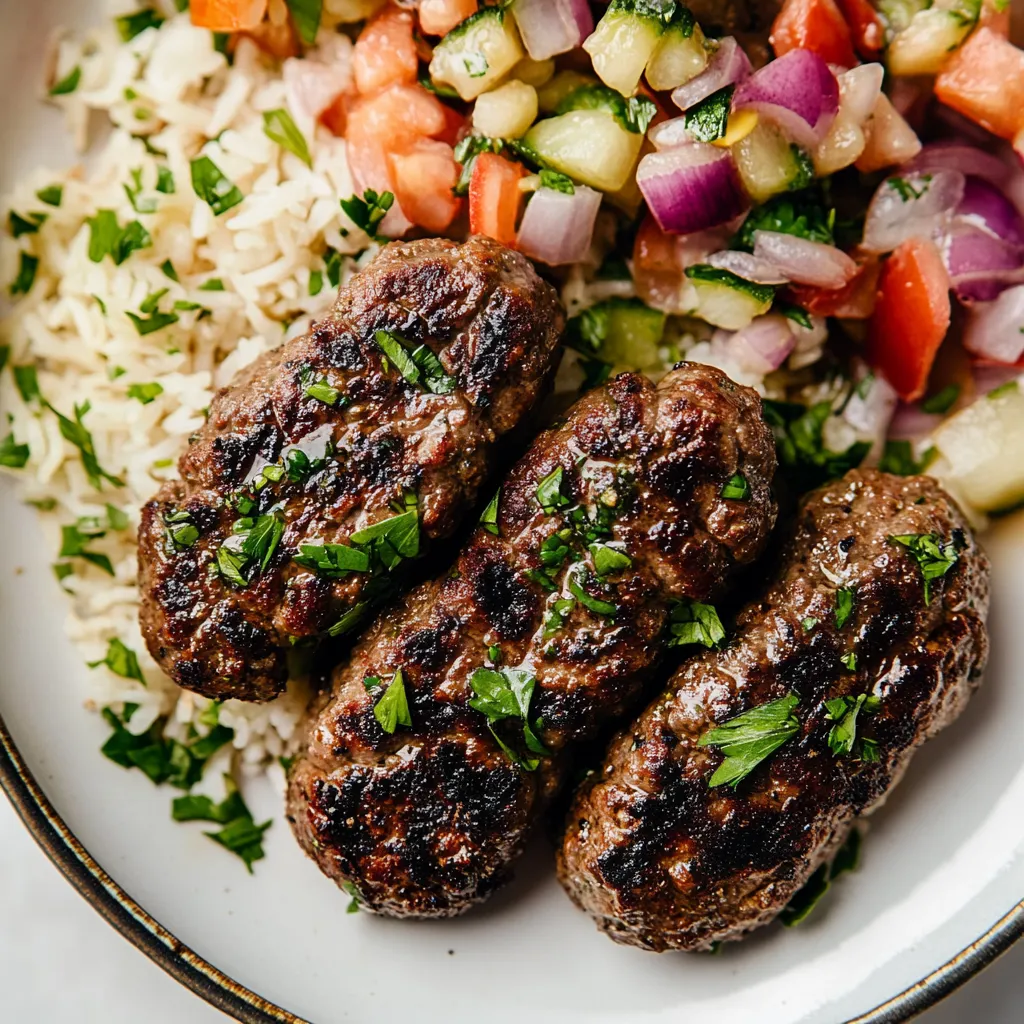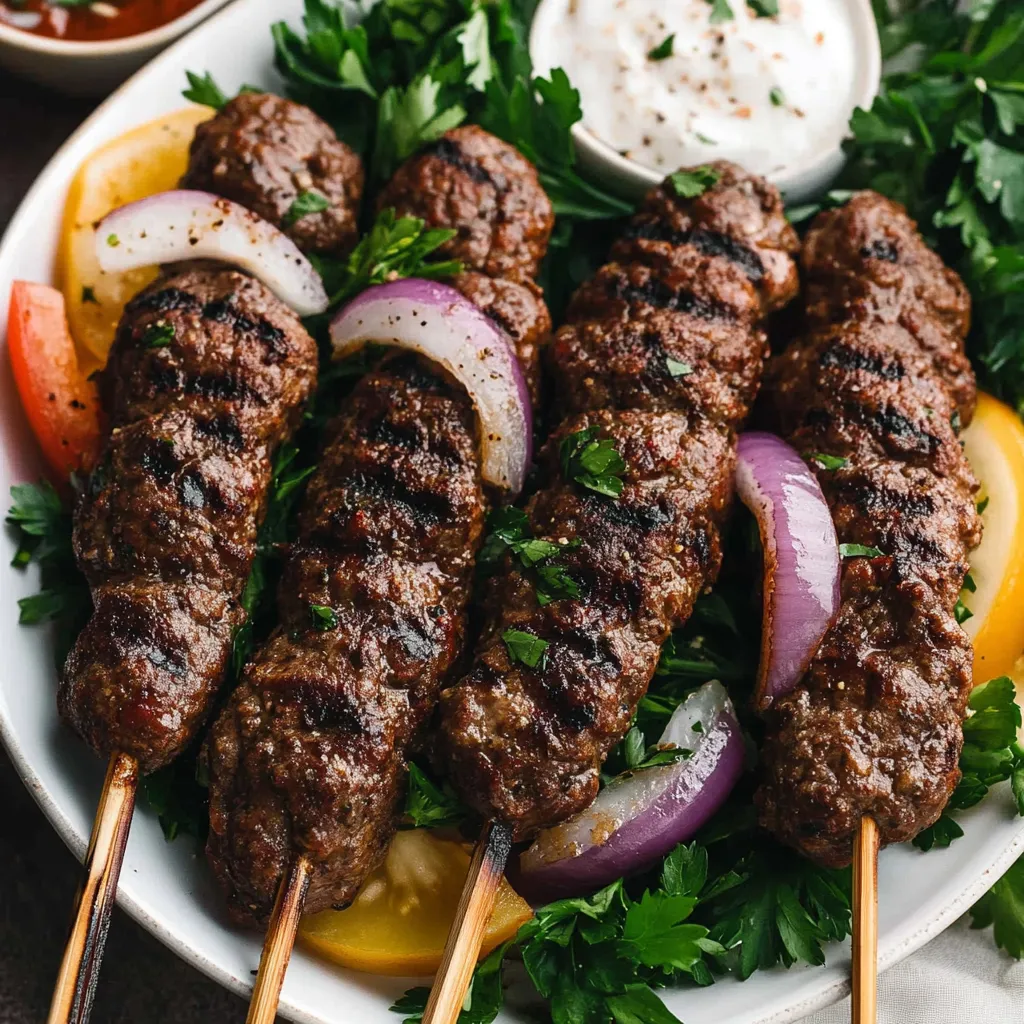 Pin it
Pin it
Beef kafta kebabs bring the rich, aromatic flavors of Lebanese cuisine right to your dinner table. These oblong-shaped meat skewers combine ground beef with a perfect harmony of herbs, spices, and aromatics to create a dish that's both comforting and exotic. The beauty of kafta lies in its incredible depth of flavor – each bite delivers a symphony of savory notes complemented by the subtle warmth of carefully balanced spices.
I first attempted making kafta after a memorable meal at a Lebanese restaurant where the kebabs were so tender and flavorful that I couldn't stop thinking about them. My early attempts were disastrous – the meat would fall right off the skewers! After many trials, I discovered that abandoning the skewers entirely was the secret to home success. Now my family requests these kebabs weekly, often fighting over the last piece.
Essential Ingredients
- Ground Beef: Opt for 90:10 lean-to-fat ratio for the perfect texture and juiciness; too lean and they'll be dry, too fatty and they'll shrink excessively
- Fresh Parsley: Provides bright color and herbaceous notes that lighten the richness of the meat
- Yellow Onion: Creates moisture and sweetness when properly processed with the meat mixture
- Sumac: This deep red spice adds a distinctive tangy, lemony flavor that's essential for authentic Lebanese taste
- Warm Spice Blend: The combination of allspice, cinnamon, cumin, and cloves creates depth without overwhelming the meat
Step-by-Step Instructions
- Step 1:
- Process the aromatics. Add 1 cup fresh parsley leaves (stems removed), 1 medium yellow onion (roughly chopped), and 4 garlic cloves to a food processor. Pulse until finely minced but not pureed – about 10-12 pulses. This step creates the foundation of flavor without turning the mixture watery.
- Step 2:
- Drain excess moisture. Transfer the minced aromatics to a fine-mesh sieve positioned over a bowl. Using the back of a spatula, press firmly to extract as much liquid as possible. This crucial step prevents soggy kafta that won't hold its shape. Allow to drain for at least 5 minutes, occasionally pressing again to remove additional liquid.
- Step 3:
- Season and process the meat. Place 2 pounds of ground beef (90:10) in the same food processor bowl. Add 1½ teaspoons kosher salt, 1 teaspoon ground sumac, 1 teaspoon ground allspice, ¾ teaspoon ground cumin, ½ teaspoon ground coriander, ½ teaspoon black pepper, ¼ teaspoon cinnamon, ⅛ teaspoon ground cloves, ⅛ teaspoon cayenne pepper, and a pinch of ground nutmeg. Pulse 4-5 times to distribute spices throughout the meat.
- Step 4:
- Combine and pulse. Add the drained aromatics to the seasoned meat and pulse another 8-10 times until the mixture becomes slightly tacky and cohesive. The meat should look slightly pasty – this texture helps it hold together during cooking. Avoid over-processing, which can make the kafta tough.
- Step 5:
- Form the kebabs. Transfer the meat mixture to a bowl and divide it into 10 equal portions. With slightly dampened hands (to prevent sticking), roll each portion first into a ball, then gently elongate into a cigar shape about 4-5 inches long and 1 inch thick. Create a slight indentation down the center with your finger to help it cook evenly.
- Step 6:
- Grill to perfection. Preheat a grill pan or outdoor grill to medium-high heat. Lightly oil the surface to prevent sticking. Place the shaped kafta on the hot grill, leaving space between each piece. Cook for 4-5 minutes per side without disturbing them too much, until nicely browned outside and just cooked through inside (internal temperature of 160°F).
- Step 7:
- Rest and serve. Allow the cooked kafta to rest for 3-5 minutes before serving. This crucial step allows juices to redistribute throughout the meat for maximum tenderness and flavor. Serve hot with vermicelli rice, fresh salad, and your choice of sauces.
 Pin it
Pin it
I'm particularly meticulous about draining the aromatics thoroughly. My grandmother taught me this trick years ago – she would actually wrap the onion-parsley mixture in cheesecloth and squeeze it firmly to extract every drop of moisture. It makes a remarkable difference in the final texture. When I make these for my nephew who typically dislikes "visible herbs" in his food, he devours them without hesitation.
The Flavor Development Secret
The magic of kafta happens during the brief resting period between mixing and grilling. I've found that preparing the mixture and shaping the kebabs about 30 minutes before cooking allows the spices to fully permeate the meat. The transformation is subtle but significant – the flavors meld and deepen, creating a more cohesive taste experience. I'll often prepare everything up to this point in the morning, cover and refrigerate, then grill them for dinner, which results in even more developed flavor.
Serving Suggestions
While these kebabs are magnificent on their own, they truly shine as part of a complete spread. I love creating a family-style platter with warm pita bread, creamy hummus, tangy yogurt sauce, and a bright, acidic salad to cut through the richness. For a particularly special meal, I'll add a side of smoky baba ganoush and pickled vegetables. The interplay of temperatures, textures, and flavors creates a dining experience that's both satisfying and exciting.
Make-Ahead Options
One of the practical advantages of kafta is its flexibility for busy schedules. The shaped raw kebabs can be prepared up to 24 hours in advance and stored covered in the refrigerator. I often make a double batch, cooking half for dinner and freezing the remaining shaped kebabs on a parchment-lined tray. Once frozen solid, I transfer them to a sealed container where they keep beautifully for up to three months. This makes for an almost instant gourmet meal on hectic weeknights.
The journey to perfecting these beef kafta kebabs reminded me that sometimes the most authentic version of a dish isn't about rigidly following tradition but adapting techniques to work in your own kitchen. Freeing myself from the anxiety of keeping the meat on skewers not only made the process more enjoyable but resulted in consistently better kebabs. The rich aroma of these spices fills my kitchen with memories of wonderful meals shared with loved ones, and the empty plate at the end of dinner is always the best compliment.
Frequently Asked Questions
- → Can I make beef kafta kebabs ahead of time?
- Yes! You can prepare and shape the kafta up to 24 hours ahead and keep refrigerated. You can also freeze them on a baking sheet, then transfer to freezer bags for up to 3 months.
- → What should I serve with beef kafta?
- Traditional sides include vermicelli rice, Shirazi salad, hummus, pita bread, and garlic sauce (toum). A simple cucumber and tomato salad also works great.
- → Can I use a different type of meat?
- Absolutely! Lamb is the most traditional alternative, but you can also use ground turkey or chicken. Just note that lower fat content meats may be slightly less juicy.
- → Do I need to use skewers?
- No, skewers are optional. You can shape the kafta into oblong patties by hand and grill them directly. Skewers just help with handling and give the classic kebab look.
- → What if I don't have all the spices?
- The key spices are salt, cumin, and allspice. If you're missing some of the others, the recipe will still work. A pre-mixed Lebanese 7-spice or baharat blend can also substitute for the individual spices.
